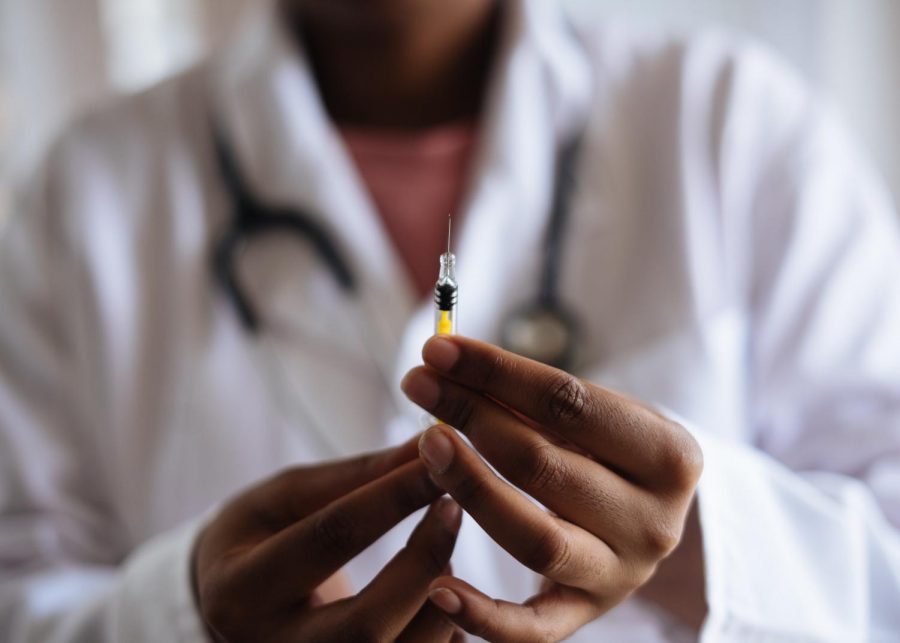U Health Vaccine Mandate Affects Employee Relationships
November 24, 2021
University of Utah Health’s vaccine mandate, approved by the U Medical Board and executive leadership team, was implemented in late September as a way to further stop the spread of the coronavirus. All healthcare workers and clinical staff had to be vaccinated in order to continue working in the hospital.
All students attending the U in person are required to get vaccinated as well. Medical and religious exemptions were approved on a case by case basis.
A U nursing major and current certified nursing assistant at the U Huntsman Cancer Institute, Cambree Bassett, was one student and employee who was required to be vaccinated. She was told she would lose her job if she did not follow the new COVID-19 vaccine guidelines.
“We had to know the timeline to get the vaccine and had to know if you didn’t have the vaccine by the timeline you were going to be fired,” Basset said. “A lot of nurses are leaving their licenses behind.”
Basset was just one of the few healthcare workers at the Huntsman Cancer Institute who had not been vaccinated before the mandate was implemented. Her co-workers questioned why she chose not to get the vaccine.
“It kind of became a little bit of you had to defend your answer instead of just being able to say ‘No I don’t want it,’” she said.
Basset was not the only healthcare provider who felt judged by her co-workers. The new vaccine mandate created an awkward environment between those who chose to be vaccinated and those who elected to not receive the vaccine.
Curtis Lundberg, another CNA at the Huntsman Cancer Institute, described his uncomfortable experiences with other healthcare workers. Like Bassett, Lundberg had not been vaccinated before the mandate.
“I tried to keep it a secret just so I don’t get into any drama with anybody,” Lundberg said. “I felt kind of looked down upon when people knew I wasn’t getting it and when I hadn’t gotten it already.”
Lundberg wanted to keep his vaccination status a secret in order to keep the peace with his colleagues. Lundberg said the usually comfortable and easy-going atmosphere was negatively affected when the vaccine mandate was implemented.
Before the pandemic hit the United States in January of 2020, patients entering the hospital were allowed any number of visitors to accompany them during their surgeries. However, when the virus spread, visitors were no longer permitted to enter the hospital.
After the vaccine mandate was approved by the U Medical Board and executive leadership team, U Health began allowing visitors again. This meant patients would have a support system by their side during surgery.
Bassett expressed her excitement towards this change. She explained how the visitor protocol now works and how it has changed since the spread of the coronavirus.
“You’re allowed to have two visitors, they can both come at the same time, only one can stay the night, and if they’re both there they have to switch off,” Bassett said.
Although the visitor protocol is not completely back to normal, patients were relieved to have visitors again. They are able to be accompanied by family and friends during tough times.
U healthcare workers and clinical staff relationships have suffered during the implementation of the COVID-19 vaccine mandate. However, patients have benefited from this change and are pleased to go back to a more “normal” hospital environment.
According to a recent video presented by the U Health CEO, Michael Good, 85% of all U Health employees have been fully vaccinated against the coronavirus.
As of Nov. 19, booster shots are now recommended for adults 18 and older who got the second dose of the COVID-19 vaccine more than 6 months ago.








Utah Mom • Dec 6, 2021 at 10:37 am
So healthcare workers who either don’t understand science or refuse to follow science don’t get support from their colleagues who do? Understanding and following public health protocols should be foundational to these roles. Just think of the effects on employee relationships when a health care worker brings home a disease that they contracted from a colleague who should have known better.
Kristt • Feb 19, 2023 at 10:12 am
Quite the contrary. They were skeptical of the science as everyone should have been and look where we’re at now. #vaxinjured #vaccineinjured, #myocarditis, #diedsuddenly, the list goes on and on.